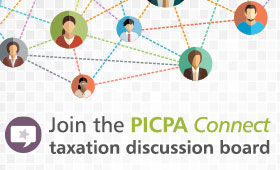Tax Resources for CPAs
Recent State and Federal Tax Updates
- IRS Announces Delay in Form 1099-K Reporting Threshold for Third-Party Platform Payments in 2023; Plans for a Threshold of $5,000 for 2024 to Phase in Implementation and Fact Sheet - Nov. 22, 2023
- Pa. DOR Tip: How to Read a Refund Check - Nov. 17, 2023
- IRS Makes Acceptance of e-Signatures Permanent - Oct. 23, 2023
- IRS Orders Immediate Stop to New Employee Retention Credit Processing. Rich Furlong, IRS senior stakeholder liaison, shares details of the Sept. 14, 2023, announcement. - Sept. 15, 2023
- Pa. DOR reminds corporate taxpayers of the requirement to submit estimated tax payments which meet the applicable safe harbor thresholds in order to avoid imposition of interest on the underpayment. Beginning January 2024, the DOR will begin issuing assessments to taxpayers for failure to meet this requirement. - June 16, 2023
- Pa. DOR Offers Clarifications and Instructions for Making Sales and Employer Tax Payments - March 24, 2023
- Pa. DOR Schedule DC - Child and Dependent Care Enhancement Tax Credit Guidance - March 7, 2023
- Pa. DOR Updated Guidance on Treatment of IRC Sec. 174 Expensing, as well as IRC Secs. 179 and 1031 - Feb. 22, 2023
- Third-Party Users Can Now Register Additional Tax Accounts for Clients They Have Access to in myPATH - Jan. 20, 2023
- Common myPATH Withholding Concerns - Jan. 20, 2023
Pennsylvania State and Local Tax
State
Pennsylvania Department of Revenue
- Contacting the DOR:
- Pa. DOR Contact List - May 25, 2023
- Pa. DOR Staff Phone Numbers - Commonwealth Directory - Dec. 2023
- Pa. DOR myPATH Technical Support - email or call (717) 425-2495 Ext. 72841 - May 25, 2023
- Schedule-A-Call e-mail Portal for Tax Professionals - May 25, 2023
- Tax Professional e-mail Service - May 25, 2023
- PA DOR Online Customer Service Center
- 2024 Tax Deadlines
- Full Transcripts from PICPA's Q&A Sessions with the DOR
- Tax Appeals
- Tips from the Pennsylvania Board of Appeals - Dec. 5, 2022
- Tax Professional e-Services
- Tax Update Newsletter
- Tax Forms, Instructions, and Publications
- Tax Laws, Policies, and Bulletins
- State Tax Summaries
- myPATH Information
- Common myPATH Withholding Concerns - Jan. 20, 2023
- myPATH W-3 and REV1667 Help Guidance - Jan. 13, 2023
- Revenue 411 Videos: myPATH system tutorials
- Guidance on Nonresident Withholding
- Notice of Waived Penalty - March 7, 2024
- Pa. PIT Guide
Local
- Pennsylvania Department of Economic and Community Development
- City of Philadelphia Revenue Department provides tax forms and instructions, information on technical rulings, and more.
- City of Pittsburgh Department of Finance offers numerous downloadable forms and information.
Internal Revenue Service
More Resources
State Agencies, Boards, and Commissions
- Commonwealth of Pennsylvania
- Pennsylvania General Assembly
- Pennsylvania Department of Revenue
- Pennsylvania Treasury Department
- Pennsylvania Office of the Budget
- Pennsylvania State Board of Accountancy
- Pennsylvania eMarketplace (Procurement opportunities)
Regulatory Resources
Federal Level Contacts & Resources
Latest Blogs, Articles, and Podcasts
State & Local Tax
-
Pa. Office Set Up to Help with IRA Renewable Energy Tax Credits
Pennsylvania Gov. Josh Shapiro created the Office of Critical Investments to maximize the federal funding made available in recent years, particularly through the 2022 Inflation Reduction Act. Louie Krak, infrastructure coordinator with the Office of Critical Investments, discusses the major tax credit incentives that are available to a wide swath of Pennsylvania entities interested in investing in diverse sources of renewable energy.Full story -
Don’t Overlook the Value of State Tax Credits and Incentives
Mar 12, 2024, 00:00 AM by Matthew Melinson, CPA, Mike Eickhoff, CCIP, Drew VandenBrul, CPA, Narj Bhogal, CPA, Benjamin Tamber, CPAIncentives are a powerful tool to urge companies to invest in a particular state that can result in a win-win for all parties involved. This issue's State & Local Tax column provides an overview of Pennsylvania’s incentives and credits landscape.Full story
Federal Tax
-
Pa. Office Set Up to Help with IRA Renewable Energy Tax Credits
Pennsylvania Gov. Josh Shapiro created the Office of Critical Investments to maximize the federal funding made available in recent years, particularly through the 2022 Inflation Reduction Act. Louie Krak, infrastructure coordinator with the Office of Critical Investments, discusses the major tax credit incentives that are available to a wide swath of Pennsylvania entities interested in investing in diverse sources of renewable energy.Full story -
What to Expect on the Federal Tax Front This Election Year
Although the Tax Cuts and Jobs Act of 2017 has most of its individual provisions expiring after 2025, there are some provisions expiring even earlier. This column explains which sections will be affected unless Congress acts to restore them.Full story

Capstan - Tax Saving Opportunities for Tangible Property and Other Fixed Assets
In the face of growing tax code complexity, it's almost impossible to cover every area with in-house resources. For expertise in understanding and applying the myriad of complexities with the Tangible Property regulations and other IRS Code impacting commercial real estate, turn to Capstan Tax Stategies.
Visit Company
CPA Now Blogs
Taxpayers Will Bear the Burden of Huge Judgements if Sovereign Immunity and Caps Are Removed
 By Curt Schroder
By Curt Schroder
The Commonwealth of Pennsylvania’s long-standing law granting sovereign and official immunity for the state, its officials, and its employees – as well as caps on damages for these entities – has been a focus in legal circles recently. You may or may not be aware of what is going on, but you should. A case before the Pennsylvania Supreme Court is a direct threat to the ability of the Commonwealth to limit its exposure to liability through the enactment of damages caps.
The policy behind sovereign immunity aims to protect the state and its entities from excessive liability and financial burden, thus allowing them to fulfill their governmental functions effectively. But one important aspect in these debates that doesn’t get enough attention, however, is why the law is necessary for taxpayer protection.
Pennsylvania law grants the commonwealth, its officials, and its employees sovereign and official immunity, except when waived. In other words, the state gives permission for it to be sued when it waives immunity in certain situations. Along with this permission structure comes the right to limit its liability exposure.
 Uncapped liability verdicts could bankrupt state or local governments. Because all governments are funded by taxpayers, all it would take is one nuclear verdict (a verdict in excess of $10 million) to wipe out funds set aside for critical government services. Jackpot jury verdicts will mean less money for social services, housing and child welfare programs, fire and police departments, public schools, and more. A huge verdict against Pennsylvania or one of our local governments would inevitably lead to higher taxes asked of taxpayers to cover the costs.
Uncapped liability verdicts could bankrupt state or local governments. Because all governments are funded by taxpayers, all it would take is one nuclear verdict (a verdict in excess of $10 million) to wipe out funds set aside for critical government services. Jackpot jury verdicts will mean less money for social services, housing and child welfare programs, fire and police departments, public schools, and more. A huge verdict against Pennsylvania or one of our local governments would inevitably lead to higher taxes asked of taxpayers to cover the costs.
It's important to note that the state’s Legislative Budget and Finance Committee issued a report on this topic and found that more than 99% of the claims fall within the current caps. In other words, more than 99% of injured victims find justice under the current limits that protect taxpayers.
Caps on damages in cases against the state or a political subdivision (city, county, township, or school district) were put in place to protect taxpayers from those seeking jackpot paydays. The fight to overturn the law is being advanced by well-known personal injury attorney Tom Kline. Kline has embarked on a self-described “22-year odyssey” to remove taxpayer protection caps in suits against state and local governments.1 In a petition to the Pennsylvania Supreme Court urging that the Commonwealth Court be bypassed from considering his Freilich v SEPTA case, Kline made the argument that caps are unconstitutional. If his theory prevails and the Supreme Court strikes down the caps, taxpayers will face unlimited liability exposure.
The American Tort Reform Association reports that trial lawyers in Pennsylvania spent $162 million on 1.43 million advertisements in 2023. If personal injury attorneys can dedicate this exorbitant amount of money on just advertising, it’s reasonable to assume they could just as easily reduce their fees (which help to pay for these ads) so victims take home more of their awards for their injuries. Rather than call for weaker taxpayer protections, why isn’t there a bigger outcry to reduce contingency fees so injured victims actually take home more money, rather than personal injury attorneys siphoning off a large portion? By addressing contingency fees, both taxpayers and injured parties would be protected.
It is easy to get swept up in the emotional messaging pushed by many personal injury attorneys. It’s designed to tug at the heartstrings. But it’s important to remember that sovereign immunity and caps on damages were put in place to protect you, the taxpayer. Personal injury attorneys shouldn’t be able to line their pockets at the expense of victims and government entities. Sovereign immunity is an important taxpayer protection and should remain in place.
1 See Legal Intelligencer, Aug. 11, 2022.
Curt Schroder is executive director of the Pennsylvania Coalition for Civil Justice Reform in Harrisburg, Pa. He can be reached at curt@pccjr.org.
Sign up for PICPA's weekly professional and technical updates by completing this form.
Statements of fact and opinion are the authors’ responsibility alone and do not imply an opinion on the part of the PICPA's officers or members. The information contained herein does not constitute accounting, legal, or professional advice. For actionable advice, you must engage or consult with a qualified professional.




Leave a commentOrder by
Newest on top Oldest on top